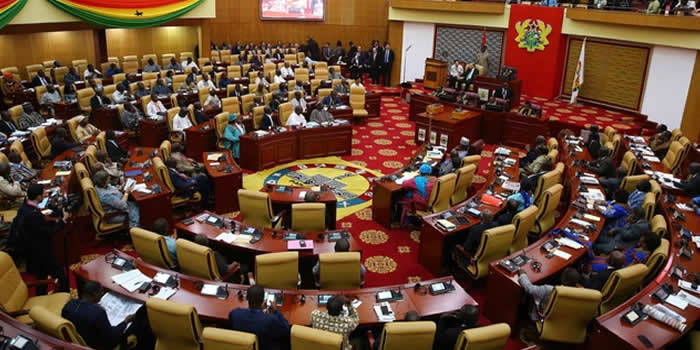Adverts
AGRICULTURE
Parliament approves US$39m loan for agriculture
Government's planting for Foods and Jobs initiative has received a major boost following the approval of US $ 39 million loan facility by Parliament to finance the Savannah Zone Agricultural Productivity Improvement Project (SAPIP).

Date Created : 3/12/2018 7:13:24 AM : Story Author : Christian Kpesese/ghanamps.com
The amount which is expected to benefit about 50,000 farmers is intended to transform the agricultural value chain for food and nutrition security, job and wealth creation within the Savannah Ecological Zone.
Chairman of the Finance Committee of Parliament, Dr Mark Assibey-Yeboah disclosed this to the House as he presented the committee's report on the Loan agreement between the government of Ghana and the African Development Fund (ADF) for an amount of US$39m to finance the Savannah Zone Agricultural Productivity Improvement Project (SAPIP).
The report indicated that the Loan agreement for an amount not exceeding 27,864,750 Units of Account which is equivalent to US$39m to finance the Savannah Zone Agricultural Productivity Improvement Project (SAPIP) will provide 50,000 farmers with skills development and employment opportunities.
According to the committee's report, the total estimated cost of the project is US$56.69m.
The ADF’s contribution for the project is US$39m representing 68.9 percent while government of Ghana and the beneficiary farmers are expected to contribute the remaining 31.1 percent mainly in kind.
The Approval
Both sides of the House in their contributions unanimously emphasised the importance of the project and accordingly echoed support for the approval of the loan agreement.
Some however urged for the need to support the farmers especially since not all may be able to contribute their quota for the success of the project.
Project Components
The project is divided into four components.
Component 1:– seeks to increase crop productivity through development of an efficient system of production, storage and distribution of breeder, foundation and certified seed, rehabilitation of four seed centres with state of the art equipment.
Component 2:- is expected to set up sustainable agribusinesses along the rice, maize, soya and vegetables value chain and will support e-registration of farmers and other value chain actors, build the capacities of value chain actors, create and strengthen innovation platforms amongst value chain actors.
Component 3:- on the other hand will provide development of transport infrastructure (feeder roads, farm tracks), rehabilitation of irrigation schemes, improvement of water harvesting and distribution for lowland rice.
Component 4:- which comprises the Project Coordination and Management Unit will be responsible for the day to day management of the project including monitoring and evaluation, gender equality and women’s empowerment as well as the implementation of the project environmental social management plan.
Project Objective
The objective of the project which is supported by the loan facility from the African Development Fund (ADF) is to help transform agricultural value chain for food and nutrition security, job and wealth creation within the Savannah ecological Zone.
The proposed project is anchored on Government’s flagship agricultural programme “Planting for Food and Jobs (PFJ)” as well as the One District One Factory (1D1F) initiative.
It is expected to increase farmers’ food and nutrition security, increase incomes through increased agricultural productivity and diversification and enhance the creation and strengthening of agribusiness to increase incomes of actors along selected value chains on a sustainable basis.
Expected Project Outcomes
The Savannah Zone Agricultural Productivity Improvement Project (SAPIP) is expected to; reduce the prevalence rate and numbers of children stunting from 33 percent to 20 percent whiles percentage of children aged 6-23 months consuming more than 4 food groups will be increased from 33.3 percent to 50 percent by the end of the project.
The SAPIP will increase productivity of rice from 2mt/ha to 6mt/ha, maize from 2.5mt/ha to 6mt/ha, soya from 1.65mt/ha to 3mt/ha to 3mt/ha by year 5.
It is expected to mechanised land preparation, husbandry, increase harvesting by additional 10,000ha annually.
Number of farmers registered and placed on platform to be increased from 35,000 to 250,000 under the project.
Four seed centres will also be rehabilitated with state of the art equipment.
These centres will be located at Tamale, Kumasi, Ho and Winneba.
Background
The Savannah ecological Zone is endowed with major agricultural potential that must be harnessed to help transform the lives of inhabitants who constitute the poorest part of the country.
The zone is characterized with challenging agro-ecological conditions, low socio-economic indicators and a historical deficit of public investments in terms of infrastructure and services.
It is therefore imperative that the development of the zone will yield positive dividends for the nation's economic growth and stability, food and nutrition security as well as job creation and poverty reduction.
The new project when implemented will consolidating the gains made through the ADF’s previous investments such as the Northern Rural Growth Programme (NRGP), the Fufulso-Sawla and Techiman-Kintampo Road Projects, optimize the usage of the infrastructure that were constructed in those interventions and leverage on private sector investment to establish large commercial farming for domestic and export markets.


 facebook
facebook X (twitter)
X (twitter) Youtube
Youtube +233 593 831 280
+233 593 831 280 0800 430 430
0800 430 430 GPS: GE-231-4383
GPS: GE-231-4383 info@ghanadistricts.com
info@ghanadistricts.com Box GP1044, Accra, Ghana
Box GP1044, Accra, Ghana